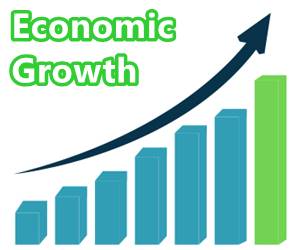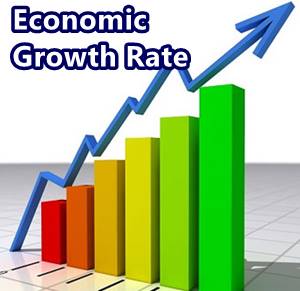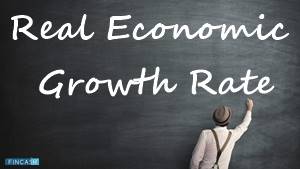Economic Growth
What is Economic Growth?
The economic growth definition refers to the overall increase in the production of products & services –in comparison to one period from another. It is known to be measured in real or nominal terms. In its simplest terms, economic growth can be referred to as the increase in the aggregate production in the given economy. In most cases, not entirely, the aggregate increase in production tends to correlate with the overall increased average marginal productivity. This is known to lead to an overall increase in the respective incomes. As such, the consumers get inspired to be open about spending and buying more –leading to a higher quality of life or improved standard of living.

Conventionally, aggregate economic growth is known to be measured in terms of GDP (Gross Domestic Product) or GNP (Gross National Product). However, there are some alternative metrics also that are utilised.
Importance of Economic Growth
In terms of economics, economic growth is mostly modelled to serve as the function of human capital, physical capital, technology, and labor force. In simple words, increasing the overall quality or quantity of the working age population along with the tools utilised by them, and the resources they have access to –all of these factors combine to form raw materials, labor, and capital. Eventually, all of these factors would lead to increased economic outputs.
Economic growth can be generated in a few ways. One of the ways is by increasing the amount of capital goods physically in the given economy. When capital is added to the economy, it helps in increasing productivity of the entire labor. New, improved, and increased number of tools implies that workers are now capable of producing more output on a per period basis. However, it is important to consider two vital factors in this aspect. Someone in the economy is expected to firstly engage in some type of saving for freeing up the resources towards the creation of new capital. Moreover, new capital should be of the right type, at the right time, and in the right place for the workers to be capable of using the same productively.
A method of generating economic growth is through technological improvement. Just like capital growth, relevant technical growth and its overall rate is significantly dependent on the overall rate of investment and savings. This is because the investment and savings are known to be vital for engaging in proper research and development. Another lucrative way of producing economic growth is by growing the available labor force. Right number of workers in given economy can increase the overall production of economic goods & services. Increasing the existing labor force also helps in necessarily increasing the total amount of output that is required to be consumed for providing the standard subsistence of the new workers.
Talk to our investment specialist
Types of Economic Growth
There are two main types of economic growth:
1. Absolute Growth
This type of growth refers to an increase in the total amount of goods and services produced in an economy. Absolute growth can be achieved through increases in the size of the labor force, increases in productivity (the amount of goods and services produced per worker), or increases in the amount of capital available for production.
2. Per Capita Growth
This type of growth refers to an increase in the amount of goods and services produced per person in an economy. Per capita growth can be achieved through increases in productivity, improvements in education and health, or increases in the number of working-age people relative to the total population. Both absolute and per capita growth are important for improving the standard of living and overall well-being of a country's population. However, per capita growth is often seen as a more accurate measure of economic progress, as it takes into account changes in the size of the population.
How is Economic Growth Measured?
Economic growth is typically measured by the percentage increase in a country's Gross Domestic Product (GDP) over a certain period of time, usually a year or a quarter. GDP is the total value of all goods and services produced in a country in a given period of time, and it is considered a key indicator of a country's economic health and progress. To calculate GDP, economists add up the total value of all goods and services produced in a country during a specific period of time, including consumer spending, business investment, government spending, and exports. This total value is then adjusted for inflation to account for changes in the cost of living over time.
There are also other measures of economic growth, such as Gross National Product (GNP), which measures the total value of all goods and services produced by a country's residents, regardless of where they are located, and Gross National Income (GNI), which measures the total income earned by a country's residents, regardless of where it is earned. However, GDP is the most widely used measure of economic growth.
All efforts have been made to ensure the information provided here is accurate. However, no guarantees are made regarding correctness of data. Please verify with scheme information document before making any investment.












